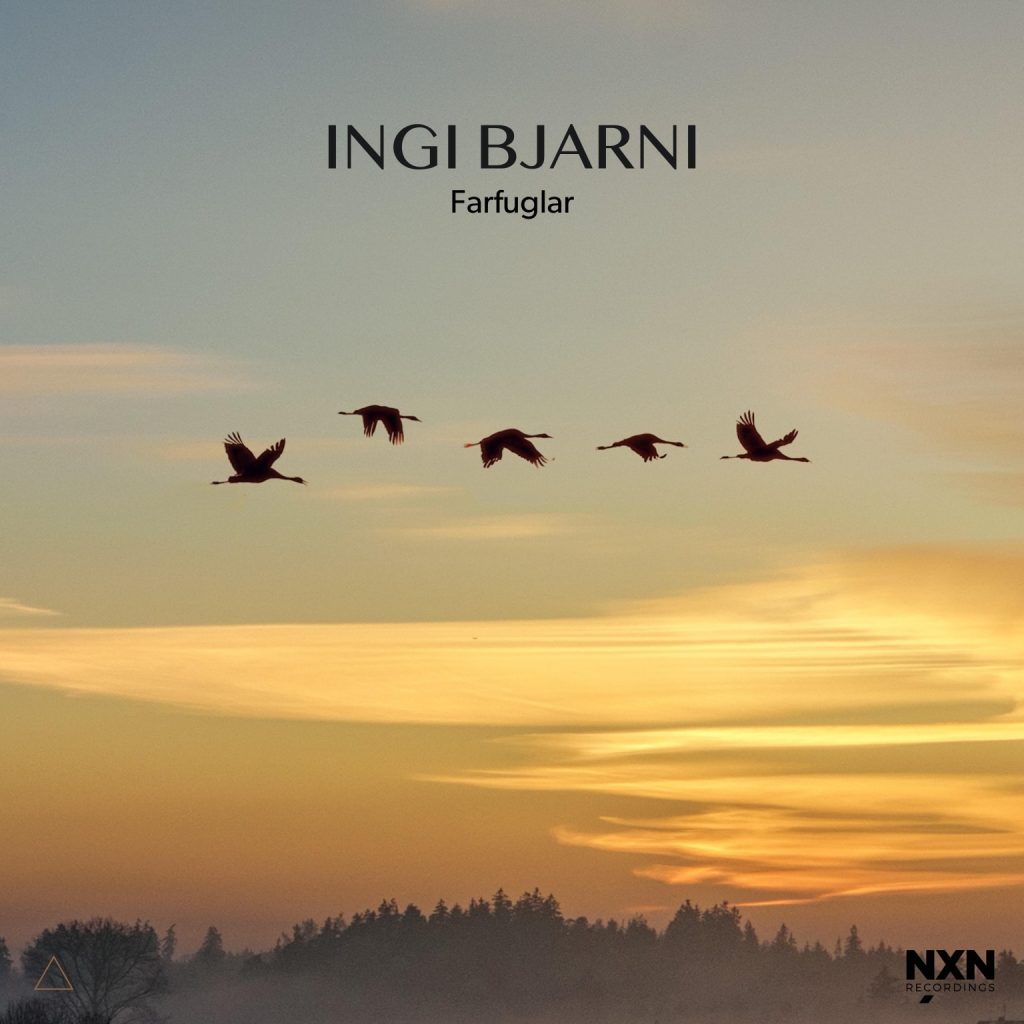Farfuglar (2023) – liner notes
A wondrous aspect of our natural world is the epic migration of birds – a recurring phenomenon based on a fundamental need for nourishment, continuity and survival, often involving extraordinary avian journeys to the farthest continents. Such perspective and freedom is surely beyond our comprehension. But, artistically, it’s a concept approached by Icelandic pianist Ingi Bjarni Skúlason and his luminous European quintet in Farfuglar (Travelling birds) – an inventive collection of original compositions and improvisations which builds on the success of 2019’s Tenging (Connection).
It’s a thrill to observe the ongoing, shared prowess of these five creative soulmates, with the leader again writing especially for the clear intonation and textural interaction of trumpeter Jakob Eri Myhre, guitarist Merje Kägu, double bassist Daniel Andersson and drummer Tore Ljøkelsøy.
As a jazz musician, Ingi Bjarni Skúlason is both acclimatised to and fascinated by the travelling life (even when, out of necessity, they are ‘virtual’ collaborations across the miles). In the studio or concert hall, the quintet’s immersion and involvement in this creative environment – strongly defined by Ingi’s intuition and openness to the psychological flow – is affectionately described by the pianist as “destroying my music beautifully”! Quick to elucidate, he enthuses that their considerable skills lie in the exploration and interpretation of his received thoughts: “They always take them to another place, so the special ingredient is our development of the compositions, together. This instrumental blend is very satisfying, but so too is the dynamic and the relationship between us – not just in musical terms”.
This remarkable rapport can instantly be heard in the impetuous downward C to Eb motif of sparky opening number Þýðing (Translation), encouraging melodic hooks and spatial improvisations to be freely shared and intertwined – note, too, the tingling key-change elevation towards its close. By way of contrast, initially pensive Bjögun á dögun (Distortion of daybreak), subliminally inspired by folk tunes and Turkish music, builds its trumpet-led crescendo through rippling, finespun guitar effects; yet a second section reveals so many other facets, closing with the piano’s graceful slow waltz.
Meditative Það sem er (That is) explores the idea of surrendering to the moment, its plaintive, tonally attuned trumpet, guitar and piano lines weaving across the rhythm section’s shifting 3/4 and 4/4 metre before giving way to contemplative, aqueous keyboard explorations. Delicately lapping Knowing without knowing shares something of that final repose, though this melancholic ‘vocalese trumpet’ lullaby ultimately rises to Skúlason’s spiky chromaticism.
Such is the quintet’s adaptability that their drive-time earworm When holiday really begins (specifically, 26 December) invokes the late ‘70s pop of, say, Elton John and ABBA, yet is hallmarked by vibrant, instinctive jazz. The imagery of exquisitely awakening Farfuglar focuses on the wide skies of migration, the players’ smooth journeying disrupted by turbulent, angular intervals, while purposeful trumpet feature Að fljúga (To fly) suggests echoes as diverse as Edvard Grieg and prog rockers Genesis. To close, thematic Loftin blá (The blue sky) is characterised by extemporisations in breezy Scandinavian jazz before emotive piano elegy Mamma engill (Mother angel) gazes heavenwards in gratitude.
Attempting to convey the elusive spirit of delight – that higher plane – which can be summoned in this music, Skúlason describes it as “a state of mind where I almost don’t need to think; a feeling of ecstasy, that everything is right at this moment in time”. In Farfuglar, his quintet’s collective impressions of flight and abandon positively connect us with a panoply of atmospheres from which to soar in our imaginations.
Adrian Pallant, June 2022
